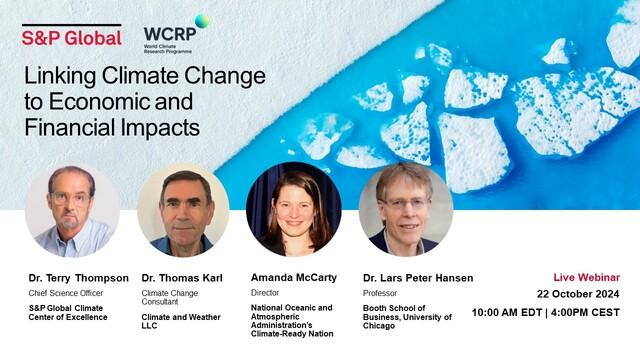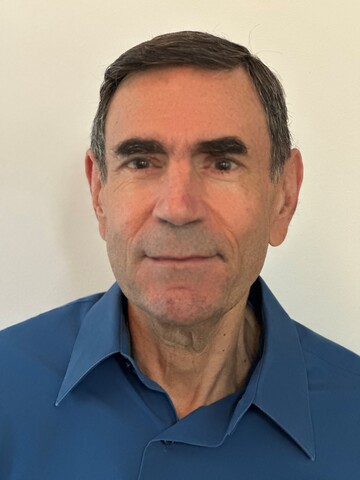 Linking physical climate hazards to economic and financial impacts requires diverse disciplines including – economics, earth-systems science, and finance. Hear from globally renowned leaders who are at the frontiers of these cross-disciplinary research areas to improve our understanding of key models, data, and methods, as well as to identify gaps that need to be addressed.
Linking physical climate hazards to economic and financial impacts requires diverse disciplines including – economics, earth-systems science, and finance. Hear from globally renowned leaders who are at the frontiers of these cross-disciplinary research areas to improve our understanding of key models, data, and methods, as well as to identify gaps that need to be addressed.
Date: 22 October 2024, 16:00 CEST
Speakers:
- Dr Lars Peter Hansen - David Rockefeller Distinguished Service Professor in Economics, Statistics, Booth School of Business & The College, University of Chicago; Nobel laureate.
- Dr Thomas Karl - Independent scholar and sole proprietor for Climate and Weather LLC; previously the Director of NOAA’s National Centers for Environmental Information.
- Amanda McCarty - Director, Climate Ready Nation, National Oceanic & Atmospheric Administration (NOAA).
Moderator:
- Dr Terry Thompson - Chief Science Officer, S&P Global Climate Center of Excellence.
Watch the recording of the webinar here:
About the speakers and moderator:
Dr Lars Peter Hansen

Lars Peter Hansen is a leading expert in economic dynamics who works at the forefront of economic thinking and modeling, drawing on approaches from macroeconomics, finance, and statistics. He is a recipient of the 2013 Sveriges Riksbank Prize in Economic Sciences in Memory of Alfred Nobel.
Hansen has made fundamental advances in our understanding of how economic agents cope with changing and risky environments. He has contributed to the development of statistical methods designed to explore the interconnections between macroeconomic indicators and assets in financial markets. These methods are widely used in empirical research in financial economics today.
The Nobel Prize recognizes this work, which has been used to test theories and models that have shaped our modern understanding of asset pricing. His recent research explores how to quantify intertemporal risk-return tradeoffs and ways to model economic behavior when consumers and investors struggle with uncertainty about the future. Improving models that measure risk and uncertainty have important implications for financial markets, fiscal policy, and the macroeconomy. (Courtesy: Personal website of Dr Hansen)
Dr Thomas Karl

Thomas Karl is currently an independent scholar and sole proprietor for Climate and Weather LLC (2017-2023). Previously, he served as Director of NOAA’s National Centers for Environmental Information and retired from NOAA after 42 years of service. He also served as the Chair of the US Global Change Research Program from 2011 to 2016.
Tom received his B.S. in meteorology in 1973 from Northern Illinois University, his M.S. in Meteorology in 1974 from the University of Wisconsin, and a Doctorate of Humane Letters (honoris causa) in 2002 from North Carolina State University for “his untiring efforts to increase the scientific community's knowledge of the global climate.”
Tom is author of many technical reports, books, and continues to publish scientific peer-reviewed articles in numerous journals. He has published over 200 peer-reviewed articles. He was identified as one of the most frequently cited Earth Scientists of the 1990s with extensive citations throughout his career. Tom has served as Lead Author, Co-convening Lead Author, and Review Editor on 5 of the Intergovernmental Panel on Climate Change (IPCC) Assessments and has also served as a Review Editor. He led the U.S. government’s delegation to the Fifth IPCC Assessment Report. He was also part of the IPCC contingent that received the 2007 Nobel Peace Prize. Additionally, he served as Co-Chair for the first and second U.S. National Climate Assessments.
Tom was elected to the status of fellow in the American Meteorological Society (AMS) and in the American Geophysical Union. He also has been recognized as a National Associate of the National Research Council for his service as Chair and member of several National Academy Committees. In 2002, he was elected to serve on the Council of the AMS and in 2007 was elected to serve as President of the AMS.
Tom has received numerous awards. He received both a Presidential Rank Award and a Distinguished Presidential Rank Award while with NOAA. He was awarded the AMS “Soumi Award” for “leadership to improve the integrity of the climate record and dedication to building a reliable climate observing system.” He also received five Department of Commerce’s Gold Medals, two NOAA Administrator’s Awards, two Department of Commerce’s Bronze Medals, the Climate Institute’s Scientific Achievement Award, and the Helmut Landsberg Award from the Association of State Climatologists.
Amanda McCarty

Amanda McCarty is the Director of Climate Ready Nation at the National Oceanic and Atmospheric Administration (NOAA). She was a Senior Advisor in the Office of the Special Presidential Envoy for Climate for the USA. Ms McCarty has 15+ years of experience in environmental policy, international negotiations, scientific research, public service, partnership development, program management, and strategic planning.
She has a Bachelor of Science in Biology from the Pacific Lutheran University and a Master in Marine Biology from the College of Charleston. (Courtesy: WMO)
Dr Terry Thompson

Thompson is the Chief Science Officer for the S&P Global Climate Center of Excellence. Thompson has led advanced climate analysis for industry for over 20 years. Prior to S&P Global, he co-founded The Climate Service and was a Senior Fellow at the consultancy, LMI, where he led the climate program. His work there focused on the application of climate data to climate-change adaptation for both government and private sectors. At LMI, he pioneered techniques to address large-scale climate-data access and computing, create value-added products and services, and link to quantitative decision-making processes. Earlier in his career, Dr. Thompson spent 12 years applying artificial intelligence techniques to defense-related problems, including underwater and space surveillance. At Gould Electronics, he established and led the Intelligent Systems Laboratory.
Thompson is former Vice President, Energy and Environment, at Metron Aviation (a subsidiary of Airbus), where he led analysis of the environmental impacts of air transport, including climate, air quality, and noise. He served as principal investigator for many NASA and FAA environmental studies and tool-development efforts over the past 20 years, and served as the project lead on an ongoing study for the Environmentally Responsible Aviation project for NASA. Dr. Thompson holds a doctorate and masters in biophysics from the University of Rochester Medical School.
He will moderate this session.
This webinar is a lead up to the Coupled Physical, Economic, and Financial Impact Modelling Workshop to be held at the World Meteorological Organization (WMO) headquarters in Geneva, Switzerland, from 20th to 22nd November 2024.


